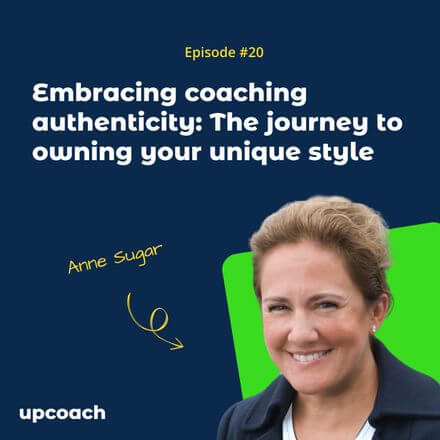Welcome to the upcoach podcast, where insightful conversations with industry leaders and experts shape the landscape of personal and professional growth. In this episode, we sit down with Anne Sugar, a distinguished executive coach and speaker, renowned for her transformative work with top leaders in companies such as TripAdvisor, Sanofi Genzyme, and Havas.
Anne’s journey is a testament to the dynamic and non-linear nature of career paths. Having previously served as the Senior Vice President of Media at Digitas, overseeing a team of 75 employees and managing media planning for Fortune 500 clients, she brings a wealth of experience to her role as an executive coach. With a BA in Communications from Boston College and coaching certification from iPEC Coaching, Anne seamlessly combines her extensive management background with in-depth coaching methodology.
In this episode, Anne shares valuable insights on the concept of the straight line versus the latticework path in one’s career. She challenges the common perception of a linear trajectory and emphasizes the importance of embracing serendipity, patience, and continuous learning to become a substantive leader.
Anne also delves into the topic of coaching authenticity, encouraging coaches to embrace their unique styles. Drawing from her own experience, she highlights the significance of owning who you are as a coach, breaking away from conventional methods, and fostering authenticity to create meaningful connections with clients.
Join us as Anne Sugar shares her wisdom on navigating career trajectories, embracing authenticity in coaching, and refining the art of active listening. This episode is a must-listen for anyone seeking valuable insights into leadership, coaching, and personal development. Tune in and elevate your understanding of what it takes to be a substantive leader in today’s dynamic professional landscape.
Episode quotes
Straight line vs. Latticework path
So I think we all think that our careers are going to just go up the mountain like this, right? In this straight trajectory. But it’s really not the case. It’s a little bit of serendipity. And I ask a lot of people that I coach, “Well, how did you get from here to there?” And people say to me, “Oh, it’s just a conversation I had, I wanted to learn something new. I was talking to a friend of mine, somebody reached out to me on LinkedIn and I wanted to kind of take this new role.”
So it kind of is a bit circular, right? In terms of how we kind of bob and weave and a lot of consultants talk about it from a lattice perspective. So I think if we really get to the underpinnings of it, it’s really about patience and learning. It’s not just this kind of straight rocket ship up, but how do we allow for the patience and the learning. And that’s how you become much more of a substantive leader.
Embracing coaching authenticity
It’s really just owning who you are as a coach. What does that mean? When I went through coaching school, you had to learn how to ask a question. You went through this very linear process. My brain doesn’t work that way. My brain goes to the shiny object.
And sometimes it might come across as, you know, kind of swirly. And so I’d always try to live in this linear process of asking a question. But I finally decided, you know what? I’m just gonna own how my brain works. So I think part of it is just as a coach, really just owning your style. And it doesn’t matter how everybody else “does” it, just own it.
A coach’s perspective on active listening and watching
There are three things that I really look for when I’m listening. And the first one is I try really hard not to formulate my next question or a thought in my head. I try really hard to live in the moment. And I also try really hard to look at people’s body language, too, just because body language never lies.
But now I’m going to contradict myself because I kind of love doing that. Sometimes I like to say a frown is just a frown. You as a coach. You’re looking for these signals, right? And these you could have a frown that’s just like a millisecond on your client’s face and you think, “Oh, I just asked the wrong question or maybe I poked too hard on this.”
Show links:
- Official Website
- Anne Sugar on Linkedin
- Anne Sugar on Twitter
